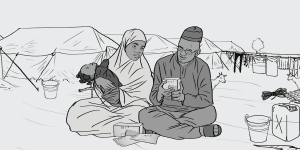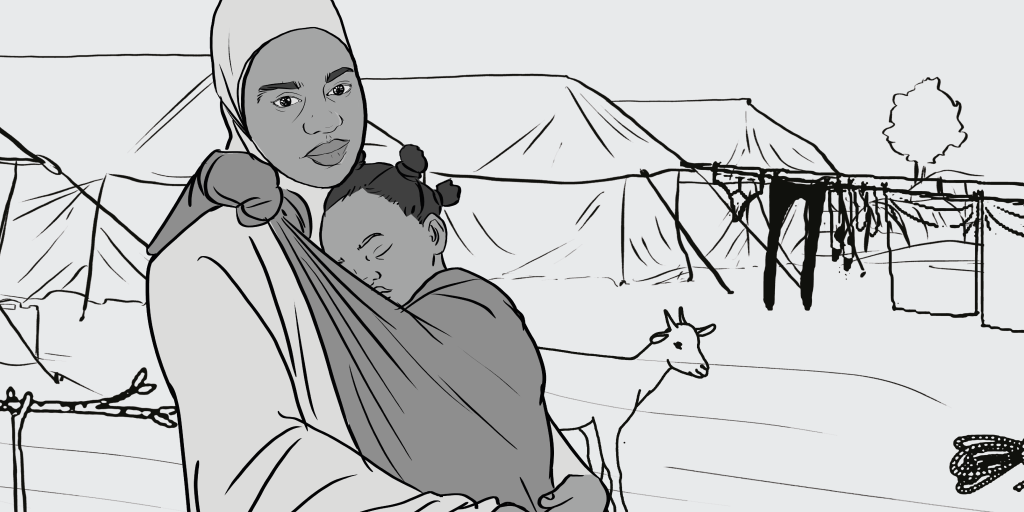Falmata*, a 25-year-old single mother from northeast Nigeria, once held dreams of a better future. Her mother tongue is Shuwa, the primary language of only 4% of households in the region. With two years of schooling, she didn’t get to learn other languages. When conflict erupted in her hometown, she was forced to flee, arriving at an internally displaced persons’ camp with her young children, Rahma* and Bakura*, carrying almost no possessions or resources.
The camp presents a harsh reality. Communication—a basic human right—has become Falmata’s greatest barrier. The aid workers around her speak Hausa and Kanuri, languages she does not understand. Each time someone tries to help, she must rely on an interpreter, her fate resting in the hands of strangers. This leaves her feeling isolated, vulnerable, and, worst of all, unheard. Falmata finds herself excluded from vital resources and services. The family struggles to secure enough food or access services and is exhausted by the relentless effort to survive in this environment. This is the case for speakers of marginalized languages in similar situations all over the world.
Marginalized voices left behind
Statistics reveal a stark reality for people like Falmata: Language barriers and low literacy compound the exclusion of marginalized language speakers. In the digital age, where information is power, almost half the world’s population—approximately 4 billion people—remain offline, as digital platforms and information are not in the languages they speak. This disproportionately affects women, rural residents, older people, people with disabilities, and those with limited education.
Critical miscommunication: Rahma’s health emergency

Recently, the weight of this communication barrier became life-threatening. When her daughter Rahma fell ill, Falmata rushed her to the camp clinic. The doctors, speaking only Hausa, were unable to get answers to their questions or understand Falmata’s explanations of her daughter’s symptoms. After a hurried examination, they prescribed medicine, but without understanding their instructions and unable to read the directions on the medicine packet, Falmata felt lost.
In her desperation, she turned to her neighbor for help, asking him to read the information on the packet for her. He missed a critical instruction: the oral rehydration salts needed to be mixed with boiled water to ensure the solution was free from germs. This small but vital piece of information was lost in translation, and it pushed Rahma into a serious health crisis.
Displaced women’s struggle for safety
Falmata’s experience highlights a painful truth: due to their dependency on others for communication, displaced women and children face heightened vulnerability, risking violence and exploitation in overcrowded camps. In a world where language barriers compound their struggles, these women often go unheard, their voices lost through circumstances beyond their control.
Language inclusion goes beyond interpretation or translation alone. For Falmata, it represents the power to access her rights—ensuring her children receive proper care and that she can secure food, shelter, health, education and safety, all without becoming trapped in a cycle of dependency.
A call for change
The experiences of marginalized language speakers like Falmata are rarely visible to those in positions to bring about change. At CLEAR Global, we are working to connect individuals like Falmata, ensuring their needs are heard and addressed.
We build technology solutions to connect marginalized language speakers. You can help support language inclusion for people like Falmata by making your donation. Some of the solutions we have developed to help speakers of marginalized languages include:
- Chatbots: text-based conversational tools designed to help people obtain accurate information. In contexts like internally displaced persons camps, chatbots help people reach available services and access essential information in their language.
- Voice-enabled tools: like chatbots, these help people get answers to their questions in their own language. Being voice-enabled, they are accessible to people who can’t read or write well. And because they aren’t human, these tools can decrease people’s fear of interacting and making complaints.
- Devices for communal use: These are devices we make available to wider communities. Those who don’t have access to their own phones can use this device to ask questions anonymously, confidently, and independently. The device could also offer audiovisual content beyond just voice, enhancing the user experience and providing a much richer information service.


*Falmata is a pseudonym for one of many women who find themselves in displacement across the world in conflict areas like northeast Nigeria.
You can help support language inclusion for people like Falmata by making your donation.